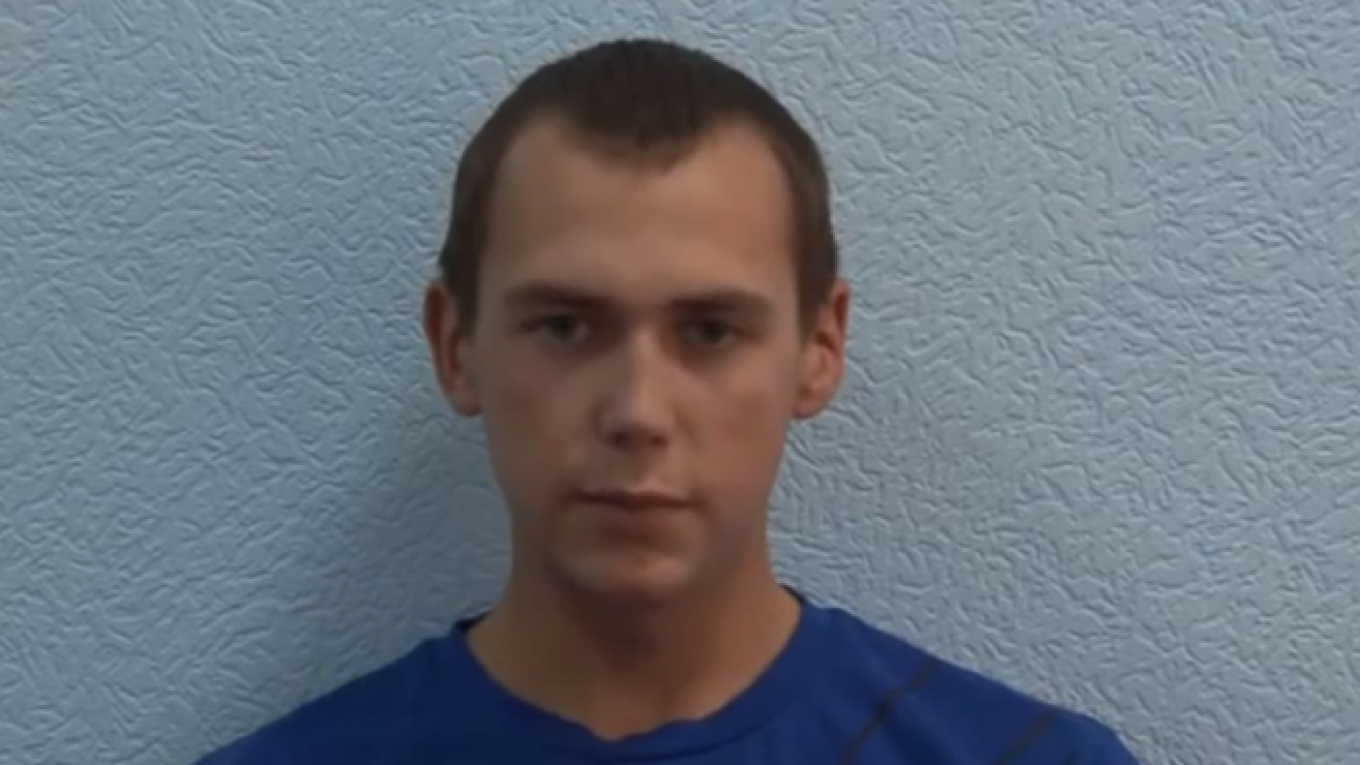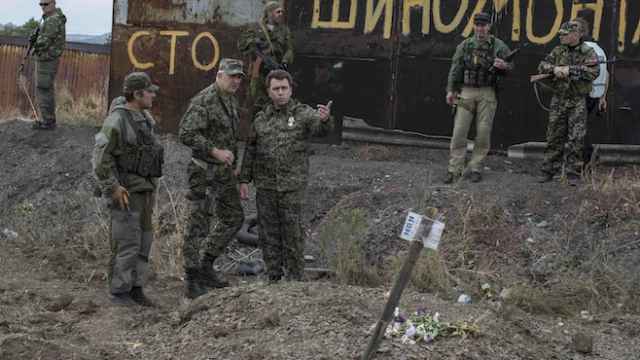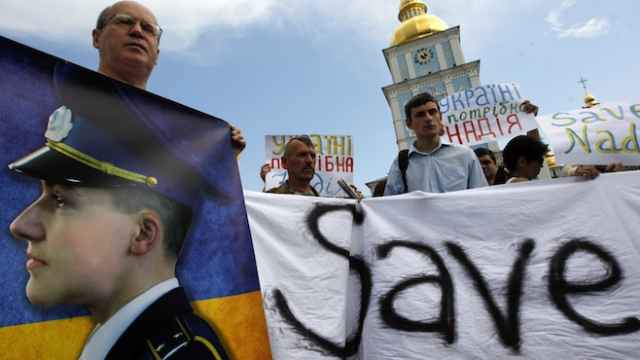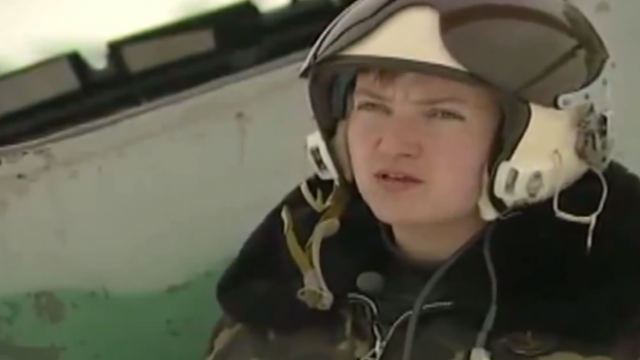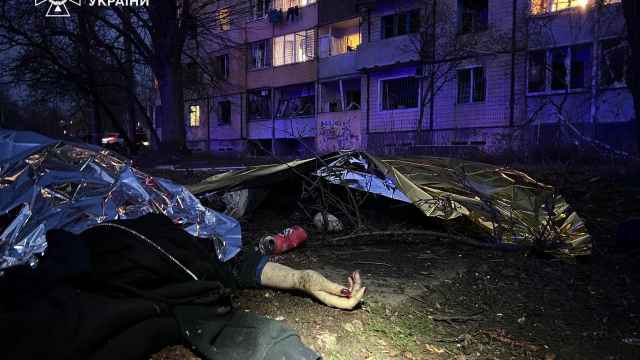A Russian soldier who was captured in Ukraine and claimed to have fled his country in protest at its involvement in a "fratricidal war" has gone missing while traveling back to Russia, his parents said.
Andrei Balobanov's parents said they had received a phone call from Moldova's breakaway state of Transdnestr and were told by the caller that their son was in the separatist region's capital of Tiraspol, the opposition Novaya Gazeta reported Thursday.
The caller offered no explanation as to how the soldier — identified by Ukraine's Security Service as Andrei Balabanov but whose last name was spelled as Balobanov by Novaya Gazeta — ended up in Moldova's separatist state.
Transdnestr lies west of Ukraine and shares no borders with Russia. But Moscow has "peacekeeping" troops in the unrecognized state, which has been suspended in a frozen conflict since the early 1990s.
The caller then put the soldier on the phone, his father, Sergei, told Novaya Gazeta.
"I could feel that he was [speaking] under duress," Sergei Balobanov was quoted as saying. "He could only speak within permitted limits. He only said that some people had 'picked up' him on the Ukrainian border and took him to a local military base. He said he was fine, except for some scratches on his face, but that, he said, was nothing."
The next call the family received came from Russia's Defense Ministry, telling them that two officers had been dispatched to escort the soldier to his original military unit in the central Russian city of Samara, Sergei Balobanov told Novaya Gazeta.
"He should already be there, but the command of the military unit responds that he is not there," Sergei Balobanov was quoted as saying. "I don't understand what is going on.
He added that the military base in Samara had redirected him to a military prosecution unit in Bryansk, saying his son had been transferred there. However, the Bryansk office denied any knowledge of the soldier and further attempts to reach commanding officers in Samara were met with replies that they were away, Novaya Gazeta reported.
Twist in the Tale
The soldier's story was wrapped in mystery even before the latest twist.
In July, Ukraine's Security Service released a statement in which it claimed a soldier — whom it identified as Balabanov — had testified that Russia was sending troops and weapons to support pro-Moscow rebels in the eastern Donetsk and Luhansk regions.
The security service also released a video testimony in which a young man identified as Balabanov recites a statement, saying he had fled to Ukraine to "protest Russia's policy against a friendly nation."
"I have decided not to participate in a possible fratricidal war, and I denounce the policies of Russia's leadership toward Ukraine, including the seizure of the territory of Crimea and the support for terrorists and separatists in the Donetsk and Luhansk regions through supplying them with weapons, professional servicemen and mercenaries from the territory of Russia," the man says in the video.
The man speaks monotonously and occasionally stumbles at lengthy passages, suggesting that he may be reading out a prepared statement.
The Moscow Times could not ascertain whether the speaker was in any way coerced or under duress.
The soldier says in the video that he had left his military unit stationed in the central Russian city of Samara to go to Ukraine but does not elaborate on how he managed to cover the distance without attracting attention for leaving his military base.
Ukraine also released videos in August featuring men who identified themselves as Russian paratroopers captured in Ukraine. But unlike Balobanov a month earlier, those men said they had been following the orders of their commanding officers who had sent them on a military march without warning them they would enter into Ukrainian territory.
Military prosecutors have opened an investigation into Balobanov's supposedly going AWOL from his unit, Novaya Gazeta reported.
But his parents have pointed out additional discrepancies. According to case materials, Balobanov left his unit on July 17 — about a week before the Ukrainian Security Service's statement was released. Yet his family says that all communication with their son stopped about month earlier when, according to case materials, he was promoted to a command post, Novaya Gazeta reported.
The soldier in the video released by Ukraine's Security Services says he had actively communicated with Ukrainians on social networks to learn their views on the conflict, but mentions nothing about his promotion nor did he mention it to his family in the month before he supposedly left the base.
Throughout the Ukrainian conflict, both Moscow and Kiev have been accused of falsifying testimonies or videos of military movements to support their cause.
Unexplained disappearances or detentions under mysterious circumstances have also abounded, with Ukrainian pilot Nadezhda Savchenko being one of the most prominent examples.
Savchenko, whom Moscow accuses of abetting the killing of two Russian journalists in Ukraine, says she was abducted in her country in June and illegally smuggled into Russia. Moscow officials say she crossed the border voluntarily, posing as a refugee.
Balobanov's parents told Novaya Gazeta that they plan to turn to human rights groups such as the Soldiers' Mothers Committee to help trace their son.
The group's St. Petersburg branch has recently been registered by the Justice Ministry as a "foreign agent," and has so far failed in its appeal to have the label removed, despite having given up foreign funding that had earned it the highly loaded label.
A Message from The Moscow Times:
Dear readers,
We are facing unprecedented challenges. Russia's Prosecutor General's Office has designated The Moscow Times as an "undesirable" organization, criminalizing our work and putting our staff at risk of prosecution. This follows our earlier unjust labeling as a "foreign agent."
These actions are direct attempts to silence independent journalism in Russia. The authorities claim our work "discredits the decisions of the Russian leadership." We see things differently: we strive to provide accurate, unbiased reporting on Russia.
We, the journalists of The Moscow Times, refuse to be silenced. But to continue our work, we need your help.
Your support, no matter how small, makes a world of difference. If you can, please support us monthly starting from just $2. It's quick to set up, and every contribution makes a significant impact.
By supporting The Moscow Times, you're defending open, independent journalism in the face of repression. Thank you for standing with us.
Remind me later.


